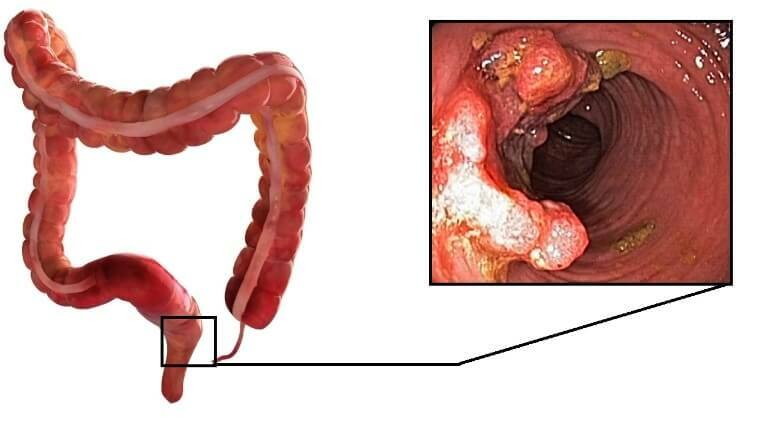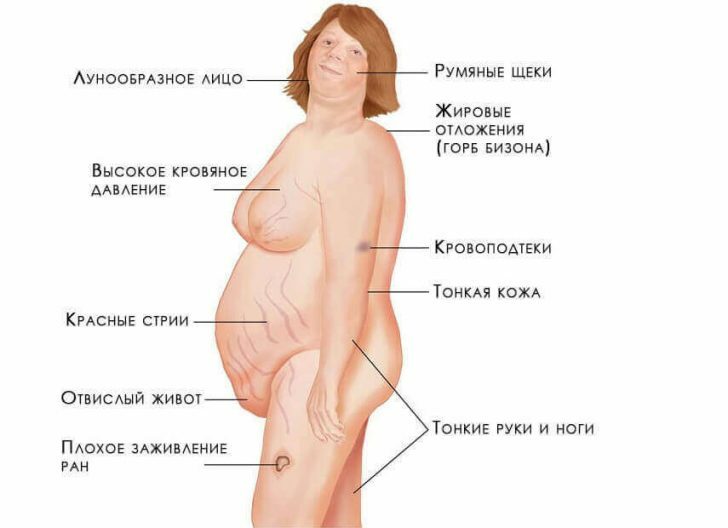Can there be breast cancer in men: symptoms and treatments for the disease

For many, it will be surprising that breast cancer can develop not only in women but also in men.Such a disease among the stronger sex is rare, but men should be aware of the possibility of a malignant tumor - the earlier the cancer is diagnosed, the higher the chances of a full recovery.
Breast cancer is the growth of a malignant neoplasm that begins from breast tissue.Similar tumors can be of various kinds.According to statistics, the chance for survival of both men and women is the same, but there is a definite problem: male breast cancer is diagnosed, as a rule, in the late stages of development.
Table of contents: Causes of developing breast cancer in men Types of breast cancer in men Symptoms of breast cancer in men Diagnostic measures Principles of treatment of breast cancerCauses of developing breast cancer in men
Unfortunately, even years of research do not give an unambiguous answerThe reasons for the formation of a cancer of the type in question in men.But doctors can indicate some of the risk factors that are capable of provoking the degeneration of healthy breast cells into cancerous
.Such risk factors include:-
 age of a man - the risk of growth of a breast cancer in men increases with his age, the average "age" of the pathology is 60 years;
age of a man - the risk of growth of a breast cancer in men increases with his age, the average "age" of the pathology is 60 years; - weighed down the heredity - every fifth man with a diagnosed underlying disease in close relatives also had breast cancer;
- reception of estrogens - they are prescribed for the treatment of many malignant tumors( for example, are included in the course of therapy for prostate cancer), with prolonged use, estrogens disrupt hormonal balance in the body, which serves as a provocative moment of cancer growth;
- hereditary genetic mutations - there is a high probability of the degeneration of healthy breast cells into cancer cells in men who carry the mutated BRCA2 gene;
- exposure to radiation or radiotherapy - even small doses of radiation exposure cause the degeneration of healthy cells into malignant cells;
- Klinefelter's syndrome is a hereditary disease that is diagnosed in 1 male out of 1000, is characterized by a lack of testosterone, an excess of estrogens, gynecomastia, a decrease in the testicle volume and often infertility.
In addition, provoking factors include congenital abnormalities of the testicles, alcohol abuse, testicular damage, work in harmful production, liver disease and obesity.
Types of breast cancer in men
In medicine, it is common to distinguish several types of malignant growth of mammary glands in men:
- Non-invasive protocol cancer.This kind of neoplasm is located in the ducts of the mammary gland, never sprouts into the subcutaneous fat and does not grow beyond the gland.Non-invasive protocol cancer is diagnosed in 10% of cases and can be surgically treated well.
- Osteo-infiltrative cancer.He is very aggressive, differs by rapid progression, practically does not give in to treatment.Fortunately, this type of oncological disease is very rarely diagnosed.
- Infiltrative ductal carcinoma.With the development of this type of cancer, malignant cells grow into fatty tissue, have an excellent ability to metastasize to other tissues and organs. Infiltrative ductal carcinoma is diagnosed in 80% of all cases.
- Paget's disease.This type of cancer begins its growth in the ducts of the breast, then the malignant cells spread into the areola or nipple.
- Infiltrative lobular( lobular) cancer.The growth of this type of malignant neoplasm begins in the lobules of the breast, after a short time the cancer grows into the subcutaneous fat.
Symptoms of breast cancer in men
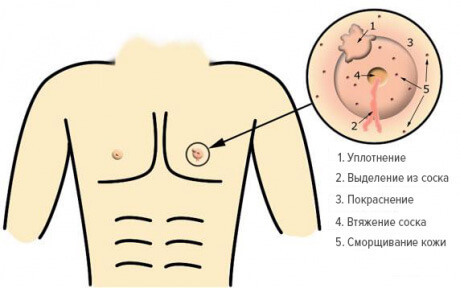
As a rule, a man quite accidentally discovers in the area of the breast or nipple a slight compaction or swelling.It is almost always painless, but it can be accompanied by wrinkling of the skin of the breast.
In addition, the oncological disease under consideration can be manifested by the following symptoms:
- discharge from the nipple;
- change of the skin in the chest area - redness, peeling, sores may appear;
- retraction of the areola.
Often, malignant breast growth is manifested absolutely nonspecific - in men the first symptom of the disease in question is an increase in axillary and / or subclavian lymph nodes.
Note : self-diagnosis of breast cancer in men can be difficult due to obesity - it is almost impossible to feel the seal.
In a man, the mammary gland is small in volume, so the cancer grows quickly enough into surrounding tissues. Metastasis of cancer cells into other organs and body systems will be accompanied by other symptoms.Clearly they can not be designated, because the symptoms will vary depending on where exactly the metastases are located.
Diagnostic measures
A man, no matter how strange it sounds, should regularly undergo preventive examinations from a mammalogist or an oncologist.Unfortunately, most representatives of the stronger sex ignore these recommendations of doctors, which leads to late diagnosis of breast cancer.When the first symptoms or suspicions appear, the man will be directed to complete a complete examination. As part of the diagnosis of breast cancer,
-
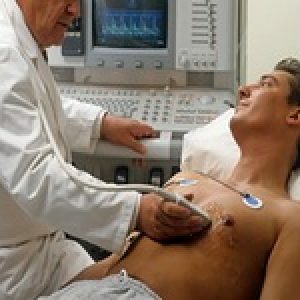 is an ultrasound examination of the breast;
is an ultrasound examination of the breast; - magnetic resonance imaging;
- incisional biopsy;
- mammography;
- laboratory studies of discharge from the nipple;
- needle biopsy;
- histological examination of altered breast tissue.
If the diagnosis of breast cancer is confirmed, then the doctor can prescribe a deeper examination for a competent appointment of therapy.
Principles of treatment of breast cancer
The general direction of therapy in this disease is almost identical with the treatment of breast cancer in women. Specific drugs, the feasibility of chemotherapy, the need for surgery - all these issues are resolved in a strictly individual order, taking into account the age of the patient, the stage of development of cancer, the type of breast cancer, associated pathologies.
Surgical treatment
The malignant breast tumor in men is removed in a variety of ways:
-
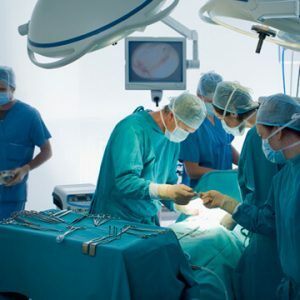 simple mastectomy - the mammary gland is removed by the surgeon along with the nipple, the muscle tissue under the gland and the axillary lymph nodes remain intact;
simple mastectomy - the mammary gland is removed by the surgeon along with the nipple, the muscle tissue under the gland and the axillary lymph nodes remain intact; - modified mastectomy - simultaneously with the tissues of the mammary gland excised and axillary lymph nodes;
- radical mastectomy - used only in the last stages of breast cancer, consists in the complete removal of not only the mammary gland with axillary lymph nodes, but also the muscles of the chest wall.
In some cases, in order to remove a malignant tumor, the men perform an organ-preserving operation of .Such a method of surgical treatment is used rarely, it is considered expedient only in those cases when the cancerous growth has not yet germinated into the nipple.The essence of the organ-preserving operation is the removal of the tumor and the minimum number of surrounding tissues.
Radiotherapy
Radiation therapy for breast cancer in men is prescribed for those patients who have already undergone an organ-saving operation, or surgical removal of tumors larger than 5 cm, or malignant cells have been found in the brain, bone tissues or lymph nodes.
Remote irradiation to the patient is carried out only over certain areas of the :
- axillary region;
- area of the breast, under which the tumor was removed;
- supraclavicular lymph nodes;
- internal thoracic lymph nodes.
Very rarely, but still can be used to treat breast cancer in men brachytherapy.This method consists in introducing pellets directly into the tissue of the malignant tumor, which emit radiation.Brachytherapy can be carried out simultaneously with remote radio-beam irradiation.
Hormone therapy
This type of treatment can be used both as an independent therapy, and as an auxiliary measure.Often hormone therapy is used for relapses of a malignant tumor, or in the case of existing metastases.
Malignant breast cancer cells in men have hormonal receptors on their surface.This fact makes it possible to distinguish between progesterone-positive and estrogen-positive types of cancer - they are perfectly amenable to treatment with hormonal drugs.
For the hormone therapy, doctors use the following drugs:
- Faslodex - is able to block and completely destroy receptors that are sensitive to estrogen;
- Tamoxifen, Fareston - block estrogen-sensitive receptors;
- Femara, Arimidex - inhibit the secretion of estrogen in the adrenal glands;
- Megestrol - competes with hormones for the receptors of cancer cells;
- Zoladex, Lupron - actively affect the pituitary gland.
Chemotherapy
Chemotherapy drugs are used by doctors in various pathology variants:
- as a preventive against relapse when the patient has already undergone an operation to remove breast cancer;
- to reduce the size of the malignant immediately before the operation to remove it;
- as a treatment for the last stage of breast cancer in men, when the tumor has already expanded beyond the breast.
Target therapy
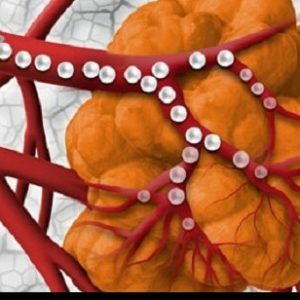 The use of targeted drugs not only prevents the growth of a malignant tumor, but also hampers their spread .A huge advantage of the therapy in question is that unlike cytostatics in chemotherapy, it does not cause the most powerful side effects.
The use of targeted drugs not only prevents the growth of a malignant tumor, but also hampers their spread .A huge advantage of the therapy in question is that unlike cytostatics in chemotherapy, it does not cause the most powerful side effects.
Target therapy is used to treat aggressive malignant tumors in the breast in men.To drugs that are prescribed to patients in the framework of targeted therapy, include Thickerb, Pearl and Herceptin.
Symptomatic pharmacotherapy
This therapy does not possess any therapeutic power, it is referred to as an auxiliary one, but this scheme helps to alleviate the condition of the patient .Within the framework of symptomatic therapy, patients are prescribed:
- antibiotics;
- expectorants;
- analgesics;
- preparations for strengthening bones;
- tranquilizers;
- remedy for the elimination of nausea and vomiting.
Breast cancer in men is a really dangerous disease, like any other malignant tumor.Doctors give quite favorable forecasts, but only if the pathology was diagnosed on time.
Tsygankova Yana Aleksandrovna, medical reviewer, therapeutist of the highest qualification category

